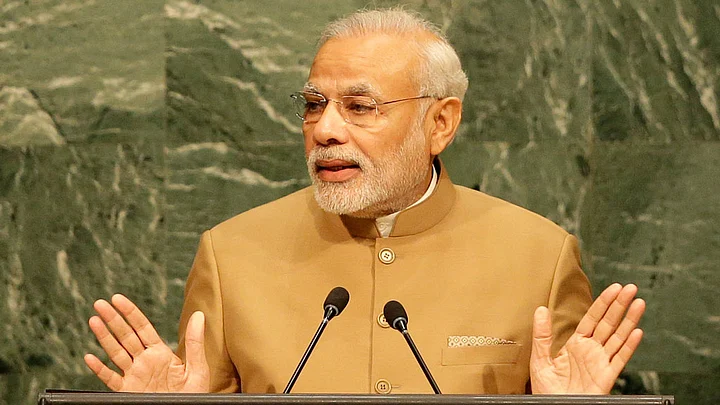When Prime Minister Narendra Modi meets President Barack Obama in the US on Monday, September 28th and they take stock of the state of the bilateral relationship, they will have reasons to be satisfied with the manner in which the Indo-US strategic partnership has gained momentum over the last ten years since the nuclear deal was signed in July 2005 and with its potential as a force for peace and stability in the Indo-Pacific.
The two leaders will undoubtedly note that China’s brazen violation of international norms, particularly in the South China Sea, and its growing military and economic power pose a long-term strategic challenge to India, the US and their strategic partners.
India’s Role in Establishing Security
- China posing long-term strategic challenge to India, US bound to be part of Monday’s talk between Narendra Modi and Barack Obama.
- India and US will need strong partners to deal with the fallout and to manage the consequences of China’s activities in Indo-Pacific.
- US expects “India to become a net provider of security” in the region.
- India might support fight against ISIS under a UN flag but may join a coalition.
- India is developing robust tri-service capabilities for military intervention.
Challenges for China
China senses the emergence of a security vacuum in the Indo-Pacific and is rushing to fill it. China has discarded Deng Xiaoping’s 24-character strategy to “hide our capacity and bide our time”. It has also dropped the phrase “peaceful rise” while referring to its military and economic growth.
China’s rapid economic growth has been fairly uneven and non-inclusive. There is a deep sense of resentment against the leadership of the Communist Party for the denial of basic freedom and rampant corruption. The discontentment simmering below the surface could boil over and lead to an uncontrollable spontaneous implosion. David Shambaugh, a well-known China scholar is the latest to have jumped on to the China-may-implode bandwagon.
Also, given its recent belligerence, China could behave irresponsibly somewhere in the Indo-Pacific. It could decide to intervene militarily in the South China Sea, or to occupy the Senkaku/Diaoyu islands or to resolve territorial and boundary disputes.
Indo-US Hedging Strategy
These contingencies have a low probability of occurrence, but will be high impact events with widespread ramifications. Both India and the US will need strong partners to deal with the fallout and to manage the consequences. Hence, the Indo-US strategic partnership makes eminent sense as a hedging strategy for both countries.
Therefore, it is imperative that the defence cooperation element of the strategic partnership is taken to the next higher trajectory to enable joint threat assessment; contingency planning for joint operations; sharing of intelligence; simulations and table-top exercises to study outcomes of various scenarios. All of these activities will need to be undertaken in concert with other strategic partners such as Australia, Japan, Singapore, South Korea and Vietnam.
Together with the US and its other strategic partners, India must take the lead in establishing a cooperative security framework for peace and stability in the Indo-Pacific and for the security of the global commons — air space, space, cyber space and the sea-lanes of communication to enable the freedom of navigation and the free flow of trade. If China is willing to join this security architecture, it should be welcomed.
What the US expects from India?
US leaders have expressed their support for India’s emergence as a major power several times in the last ten years. They have used phrases like the US is committed “to help India become a major world power in the 21st century” (briefing by US official after the visit of Secretary of State Condoleezza Rice, 2005); “India is not just a rising power, it has already risen” (President Obama, 2010).
Now the US expects “India to become a net provider of security” in the region, but the expectations have not been stated in specific terms. When asked, US officials normally point to India joining international counter-terrorism and counter-proliferation efforts; sharing intelligence; upholding the rules and norms governing maritime trade; providing help to the littoral states to meet their security needs; helping to counter piracy and narcotics trafficking; and, continuing to take the lead in humanitarian and disaster relief (HADR) operations in the region.
While all of these expectations are unexceptionable and India has been contributing extensively to achieving these common goals, there is little understanding of the extent of cooperation expected from India in terms of ‘hard’ military power. The US had requested India to send an infantry division to Iraq during the war in 2003. India had declined to do so as it was not a vital national interest.
Support against the ISIS
A similar request is again being made informally by visiting US scholars for fighting the militia of the so-called Islamic State (ISIS). Once again, it is not a vital national interest. By definition, only vital interests are to be defended by employing military force when threatened.
India is developing robust tri-service capabilities for military intervention. India will not hesitate to intervene in conjunction with its strategic partners if its vital national interests are threatened in its area of strategic interest, which extends from the South China Sea in the east to the Horn of Africa in the west.
India would prefer to do so under a UN flag but may join a coalition of the willing in case, consensus is difficult to achieve in the UN Security Council.
(The writer is former Director, Centre for Land Warfare Studies (CLAWS), New Delhi.)
